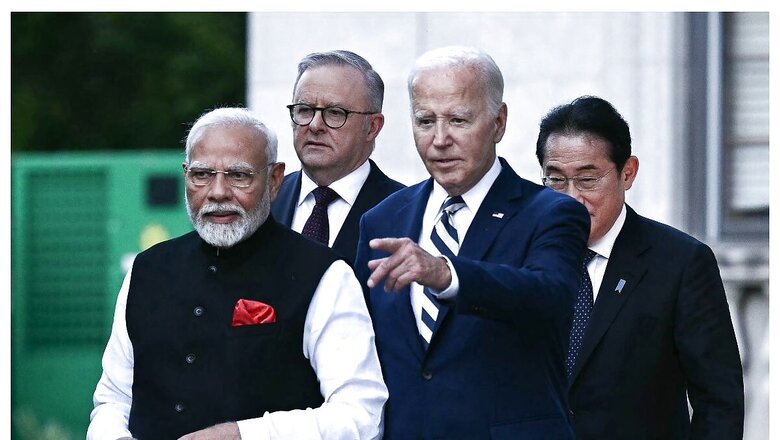Straight Talk | QUAD Arrives In the Indo-Pacific: India, US, Japan & Australia Begin Taking on China

views
The QUAD leaders’ summit hosted by the United States last week was truly a very consequential one. In attendance were US President Joe Biden, Indian Prime Minister Narendra Modi, Australian PM Antony Albanese and Japan’s Fumio Kishida. The leaders used unusually strong language in their joint statement after the summit, without directly naming China. However, the message must have been received lock, stock and barrel in Beijing, and upset quite a few on the red high table. After all, this summit will go down as the one where QUAD nations, for the first time ever, announced joint Coast Guard operations to patrol the waters of the Indo Pacific, including the South China Sea.
The importance of this announcement, among many others, cannot be stated enough. China has been in the news over the past few months for its coast guard’s wanton disregard of international rules in the South and East China Seas. Particularly concerning are the Chinese Coast Guard’s aggressive manoeuvres against the Philippines, with no less than Chinese vessels ramming into Philippian ships.
QUAD has now condemned such bullying, with their joint statement saying, “We are seriously concerned about the situation in the East and South China Seas. We continue to express our serious concern about the militarisation of disputed features, and coercive and intimidating manoeuvres in the South China Sea. We condemn the dangerous use of coast guard and maritime militia vessels, including increasing use of dangerous manoeuvres. We also oppose efforts to disrupt other countries’ offshore resource exploitation activities."
In this backdrop, the QUAD’s decision to launch joint coast guard operations in the Indo Pacific becomes extremely important. Not only is it a direct signal to China – that it must cease and desist, but is also a move aimed at reassuring countries in the Indo Pacific that QUAD now has its skin in the game. For starters, coast guard personnel from all four QUAD nations will board an American ship to patrol the region starting next year. Subsequently, more such missions will be added. Along with the Malabar exercises which the four nations already participate in, joint coast guard missions will further bolster interoperability among their forces.
It is not surprising, therefore, that Prime Minister Modi sought to convey QUAD’s arrival to the world. During his opening remarks at the summit last Saturday, Modi said, “Our message is unequivocal: QUAD is here to stay, to assist, to partner, and to complement." Joe Biden echoed the same, saying, “While challenges will come, the world will change, but the Quad is here to stay."
LOGISTICS, PORTS, SEMICONDUCTORS & MARITIME SECURITY: QUAD EXTENDS A HELPING HAND
Another key outcome of the QUAD summit this year has been the launch of a Quad Indo-Pacific Logistics Network pilot project to pursue shared airlift capacity among the four nations. This will help the US, India, Australia and Japan leverage collective logistics strengths to support civilian response to natural disasters more rapidly and efficiently across the Indo Pacific region.
What was intentionally not mentioned, perhaps, was that such a logistical agreement can also be used in times of military conflict to achieve more security-oriented goals. Besides, the active involvement of QUAD nations in responding to natural disasters and calamities across the Indo Pacific will help build some crucial goodwill for the alliance in the region.
Speaking of goodwill, the QUAD has also announced an ambitious Cancer Moonshot Initiative, which will see the rollout of 40 million doses of India-made HPV vaccines to tackle the menace of cervical cancer across the Indo Pacific.
Besides, QUAD is now going big on ports and their development. To that end, the four countries have now launched the ‘Quad Ports of the Future Partnership’. The first ‘Quad Regional Ports and Transportation Conference’ is scheduled to take place in Mumbai in 2025. QUAD hopes to leverage resources to mobilise government and private sector investments in quality port infrastructure across the Indo-Pacific region. This must be seen as a direct challenge to China and its Belt and Road Initiative, which has prioritised building ports to advance Beijing’s strategic interests in the region.
Meanwhile, in an attempt to expedite the decoupling of critical supply chains away from China, QUAD has launched a Memorandum of Cooperation for a ‘Semiconductor Supply Chains Contingency Network’. This MoU will pave the way for enhanced cooperation among QUAD nations towards the development of critical technologies and securing their supply chains.
There is a separate private sector initiative – called Quad Investors Network (QUIN) – which facilitates investments in strategic technologies, including clean energy, semiconductors, critical minerals, and quantum. QUIN is already mobilising a number of investments to promote supply chain resilience, advance joint research and development and commercialise new technologies.
A direct result of QUAD’s mission to secure the semiconductor supply chain has been India and US’ agreement to set up a semiconductor fabrication plant in Kolkata. This critical investment will help India make chips that can be used in “national security, next generation telecommunications and green energy applications." It is no secret that in the next few years, India hopes to emerge as a global semiconductor behemoth. The chip plant in Kolkata will help India join an elite club of nations that can domestically manufacture such critical and advanced chips.
Alongside their collaboration on semiconductors, QUAD has also unveiled the Maritime Initiative for Training in the Indo-Pacific (MAITRI). This programme is designed to strengthen the abilities of Indo-Pacific partners to effectively monitor and protect their maritime territories. The QUAD’s strategic alliance is built on shared values, with a strong focus on maintaining international law and promoting a free, open, and inclusive Indo-Pacific. This initiative can go a long way in countering China’s claims of QUAD being an “Asian NATO," as it seeks to equip and empower countries in the Indo Pacific to better protect their interests.
Most importantly, QUAD’s partnership to lay high-tech subsea cable networks is becoming manifest. The goal of the four QUAD nations is to set up China-proof underwater cables, which will dramatically reduce not just their own, but the world’s exposure to undersea cables that have been infiltrated by China. Starting in 2025, Western companies, the primary installers of subsea cables, will largely avoid China. India has significant stakes in this industry and plans to dramatically increase its capacity with the launch of three new cables: 2Africa Pearls, India-Asia-Xpress (IAX), and India-Europe-Xpress (IEX). Major Indian players like Airtel and Reliance will join global giants such as Amazon, Google, and Meta in this growing sector.
HAS INDIA EMERGED AS THE NEXT LEADER OF QUAD?
For years, geopolitical analysts often labelled India as the “weakest link" in the Quad alliance. However, India is now rapidly positioning itself as a potential leader within the group. During a recent press conference, when asked if the Quad was “here to stay", U.S. President Joe Biden made a telling gesture toward Prime Minister Modi and said, “Long after November," hinting that India could soon emerge as the driving force behind the Quad’s future.
This shift in leadership potential is not just symbolic. With Biden set to leave office, Japan’s Prime Minister Fumio Kishida is also expected to step down next. Similarly, Australian Prime Minister Antony Albanese faces an uncertain political future as he approaches an election in 2024. In contrast, Prime Minister Modi is expected to remain in power for the foreseeable future, giving India the rare opportunity to provide continuity and leadership in the Quad.
As Modi will soon become the most senior leader among the Quad nations, India’s influence is poised to grow substantially within the alliance, shaping the Indo-Pacific’s strategic direction in the coming years.
This newfound leadership role for India aligns with its broader aspirations on the global stage, positioning it as a key player in balancing power dynamics, particularly against China’s growing aggressiveness in the Indo-Pacific.





















Comments
0 comment